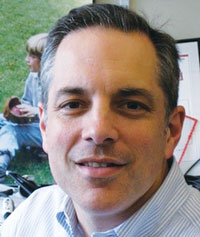Mixing
Disciplines: BWH Researcher Edelman at TEDMED 2013
 |
| Elazer Edelman, MD, PhD |
On April 18, Elazer Edelman, MD, PhD, BWH Cardiovascular
Division, owned the stage at the Kennedy Center in Washington, D.C., during the
annual TEDMED 2013 event April 16 to 19. Edelman was among many experts from
medicine, technology and entertainment who shared their views and ideas with an
audience of leaders and innovators seeking to create a brighter future in
health and medicine.
TEDMED is an annual conference that brings together a
multidisciplinary community of innovators and leaders to share creative ways to
change the world of health and medicine. Edelman's talk titled "The Big Bang in
Medicine and Engineering: Will the Knowledge Explosion Actually Hurt Innovation
Across Disciplines?" focused on the paradox of how science is conducted today.
According to Edelman, the sciences have greatly expanded and become more
energetic, in their own right, especially as more bench-to-bedside research is
being conducted.
He explains that just at the time scientists and
clinicians are forced to become multidisciplinary to deal with complex diseases
and emerging converging technologies, mastery of multiple disciplines is
becoming ever more difficult. According to Edelman, exciting disciplines grow
by increasing in mass and velocity, which raises their energy but also moves
them further from each other.
How then should we enable multidisciplinary thinking?
Edelman believes the solution lies in not just asking people to master several
disciplines, or pooling individual experts from various disciplines together;
but rather by focusing on integration, and not only teaching engineering and
medicine, but teaching approaches to integrating disciplines.
"Integration is as or perhaps more important than
mastery," said Edelman. "This has been the enabling mechanism behind many
recent advances in medicine, but will be increasingly required as we consider
how to translate basic science findings rapidly into the clinic and community."
Edelman himself successfully balances clinical work with
research at BWH, serving as a senior attending physician, as well as a bioengineer
leading a research lab that examines the mechanisms behind how tissues repair
themselves. Edelman's lab has been credited for helping develop and enhance
drug-eluting stents (devices used to treat blocked arteries) and advance the
understanding of vascular biology and diseases.
He also serves as chief scientific advisor of the science
journal Science: Translational Medicine,
is a fellow of both the Institute of Medicine and National Academy of
Engineering, and member of the U.S. Food and Drug Administration Science Board.
To learn more about TEDMED, visit www.tedmed.com.